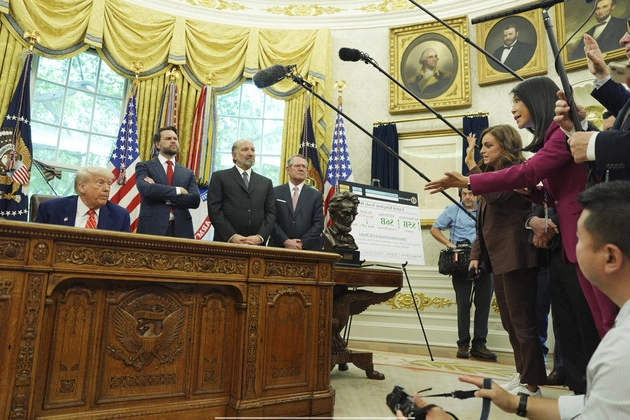
President Donald Trump achieved his first trade win ahead of his global debut in the Middle East, marking a significant milestone in international relations.
The agreement with the United Kingdom, announced in the Oval Office, represents a groundbreaking framework focused on specific trade sectors, laying the groundwork for further negotiations.
Challenges and Opportunities Ahead
Despite the optimistic tone of the announcement, the road ahead is filled with challenges as the U.S. navigates complex trade relations with numerous countries under heavy tariffs.
Everett Eissenstat, former deputy director of the National Economic Council, emphasized the importance of time in crafting durable trade agreements, noting the extensive queue of countries awaiting negotiations.
Key Highlights of the Deal
Under the agreed framework, the U.S. plans to export $5 billion worth of products such as ethanol, beef, and machinery to the UK, alongside other agricultural goods. In return, the UK will enjoy lower tariffs on 100,000 cars and zero tariffs on steel exports to the U.S.
However, certain contentious issues remain unresolved, including the digital services tax and tariffs on pharmaceuticals.
Looking Towards the Future
While Trump hailed the deal as comprehensive, indicating room for expansion, Agriculture Secretary Brooke Rollins tempered expectations by highlighting the preliminary nature of the agreement.
Notably, the eleventh-hour negotiations underscored the urgency to ease economic tensions and foster positive relations with trading partners, positioning the UK deal as a stepping stone towards broader economic stability.
Implications for Global Trade
Although the UK trade volume represents a fraction of total U.S. trade, the deal sets a precedent for future agreements with countries like India, Japan, and South Korea. These agreements are envisioned as frameworks for ongoing discussions rather than finalized trade pacts.
The expedited nature of the UK deal, compared to other negotiations, reflects the mutual interest in diversifying trade partnerships amid evolving geopolitical landscapes.
Ensuring Sustainable Agreements
The phased approach to negotiations emphasizes the importance of meticulous planning and legal clarity in trade deals. These agreements are expected to evolve from initial terms sheets to comprehensive outlines, with legal experts ironing out the finer details.
While challenges persist in ongoing negotiations with various partners, the administration remains committed to securing agreements that benefit American interests and promote long-term economic growth.
Conclusion
The UK trade deal symbolizes a significant milestone in U.S. trade relations, laying the groundwork for future agreements and setting a precedent for transparent, mutually beneficial trade partnerships.
As negotiations with other countries progress, the focus remains on fostering sustainable agreements that uphold American economic interests and strengthen global trade relations.











